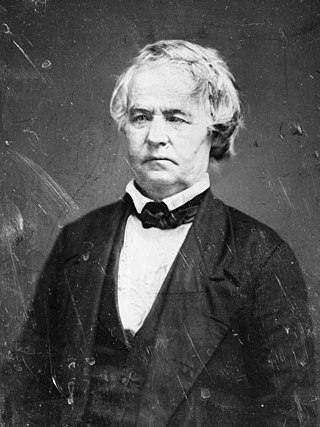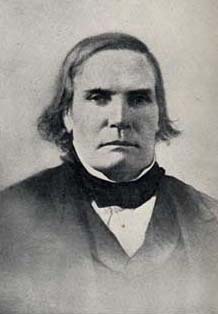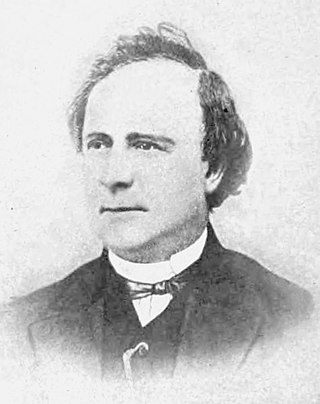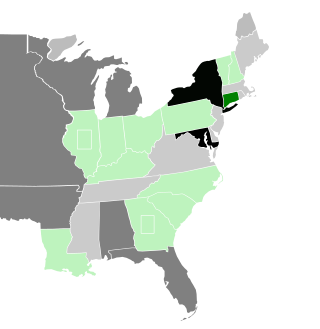
Joseph Vance was a Whig politician from the U.S. state of Ohio. He served as the 13th governor of Ohio and was the first Whig to hold this position.

Ethan Allen Brown was a Democratic-Republican politician. He served as the seventh governor of Ohio.
Since Illinois became a U.S. state in 1818, it has sent congressional delegations to the United States Senate and United States House of Representatives. Each state elects two senators to serve for six years, and members of the House to two-year terms. Before becoming a state, the Illinois Territory elected a non-voting delegate at-large to Congress from 1812 to 1818.

The Treaty of St. Mary's may refer to one of six treaties concluded in fall of 1818 between the United States and Natives of central Indiana regarding purchase of Native land. The treaties were
The 1818–19 United States House of Representatives elections were held on various dates in various states between April 26, 1818 and August 12, 1819. Each state set its own date for its elections to the House of Representatives before the first session of the 16th United States Congress convened on December 6, 1819. They occurred during President James Monroe's first term. Also, newly admitted Alabama elected its first representatives in September 1819, increasing the size of the House to 186 seats.

Jesse Burgess Thomas was an American lawyer, judge and politician who served as a delegate from the Indiana Territory to the tenth Congress and later served as president of the Constitutional Convention which led to Illinois being admitted to the Union. He became one of Illinois' first two Senators, and is best known as the author of the Missouri Compromise of 1820. After his retirement from the U.S. Senate in 1829 he lived the rest of his life in Ohio.
Franklin Corwin was a United States representative from Illinois.

John William Allen was an American lawyer and politician from Ohio. He served two terms in the United States House of Representatives from 1837 to 1841 and also served as the fourth Mayor of Cleveland.
James Carr, son of U.S. Congressman Francis Carr, was a member of the United States House of Representatives from Maine, then a District of Massachusetts.

Harrison Gray Otis Blake was a U.S. Representative from Ohio.

Joseph Randolph Cockerill was a U.S. Representative from Ohio for one term from 1857 to 1859.

Rodolphus Dickinson was an American lawyer and politician who served one term as a U.S. Representative from Ohio from 1847 to 1849.
William Doan was a U.S. Representative from Ohio for two terms from 1839 to 1843.
William Wilson was a 19th-century American lawyer and politician who served two terms as a U.S. Representative from Ohio from 1823 to 1827.

Humphrey Howe Leavitt was a United States representative from Ohio and a United States district judge of the United States District Court for the District of Ohio and the United States District Court for the Southern District of Ohio.

The following outline is provided as an overview of and topical guide to the U.S. state of Illinois:

The 1818–19 United States Senate elections were held on various dates in various states. As these U.S. Senate elections were prior to the ratification of the Seventeenth Amendment in 1913, senators were chosen by state legislatures. Senators were elected over a wide range of time throughout 1818 and 1819, and a seat may have been filled months late or remained vacant due to legislative deadlock. In these elections, terms were up for the senators in Class 3.

Pennsylvania elected its members October 13, 1818.

On January 1, 1818, a special election was held in North Carolina's 7th district to fill a vacancy left by the death of Representative-elect Alexander McMillan (F) before the 15th Congress had assembled.
This page is based on this
Wikipedia article Text is available under the
CC BY-SA 4.0 license; additional terms may apply.
Images, videos and audio are available under their respective licenses.













